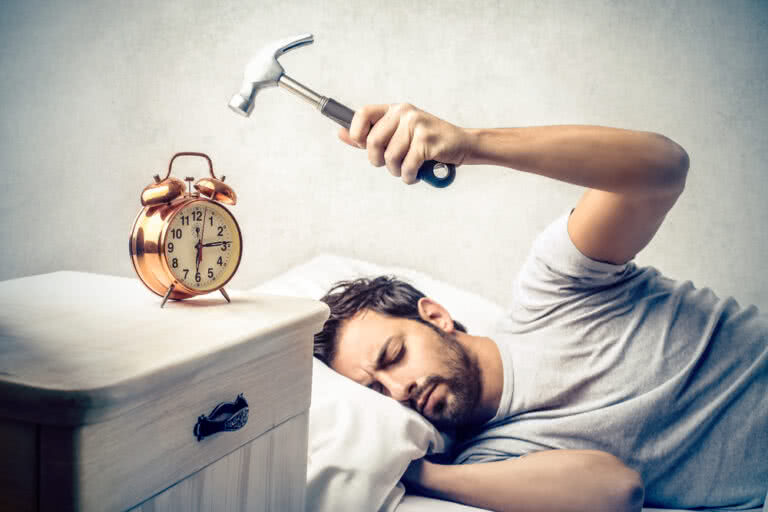Struggling with how to get up early in the morning? When you’re not a morning person, early starts can be difficult. Lockdown restrictions have also presented a challenge, as instead of needing to leave the house for work or other plans, we’ve spent more time indoors.
This struggle with early mornings isn’t necessarily a choice. Researchers have measured the impact of sleep habits on brain function, using the two “sleep chronotypes” of night owl and morning lark. By having to get up early and commit to the nine-to-five working pattern, they found that night owls are fighting against their internal body clock. So, how can you make the most of your natural sleep preferences as a night owl, and still enjoy productivity in the early morning time?
To help, we’ve created a step-by-step guide on how to start waking up early – whether you’re returning to the office after lockdown or your event calendar is filling up.
Step one: prepare gradually
Whether you’re hosting an event or attending an exciting conference, preparing your body in advance can help you to feel your best and relax in the run-up. You can help your body get ready for an early start by amending your sleep patterns in the week leading up to it. Try to get up 10 minutes earlier each morning, and on the day you need to be up at the crack of dawn, it’ll feel a little bit more manageable.
Step two: limit your caffeine intake
Caffeine is a stimulant, keeping your body going even when it would be better to rest. For your best chance of a good night’s sleep (and an easier time getting up early), try not to drink too much coffee during the day. According to the Sleep Foundation, a safe amount of coffee to drink is around 400 mg (four to five cups per day). And try not to drink tea or coffee after 6 p.m. for the best chance of falling asleep soundly.
Step three: don’t use screens before bed
Links have been found between blue light and sleep troubles. Exposure to blue light before you sleep can suppress the production of melatonin, a hormone that controls the sleep cycle. So if you’re aiming for a 10 p.m. bedtime, try not to use screens after 9 p.m. Instead of scrolling through your emails or checking your event sign-ups, choose a place outside of your bedroom to place any devices at the end of the day. Then read or listen to music to help you drift off.
Step four: beat your body clock
Wondering how to feel more awake in the morning? While you might have a natural predisposition for staying up late, the good news is that there are a number of ways you can work around your biology and reset your body clock. The key is to wake up at the right time, in the period of sleep where you’re closest to being awake.
Our sleep cycle generally consists of two different states: rapid-eye movement sleep (REM) and non-rapid eye movement sleep (NREM). The body goes through these 90-minute cycles multiple times a night, and if you can wake up at the end of one, you’ll feel less sluggish and more awake.
You can calculate what time your 90-minute cycles will end by counting back to the time you wish to go to bed or by using an app. The Sleep Cycle app uses microphones to pick up on your movements as you sleep, detecting what sleep stage you’re at. 30 minutes before the end of your cycle, it’ll begin to wake you up gently, so you start your day refreshed and energised.
Step five: wake up naturally
If you’re struggling to get up in the morning, light exposure might also help. Daylight stimulates hormones, which help you to feel less sluggish. If you don’t fancy sleeping with the curtains open all night, incorporate a handy gadget like the Lumie Bodyclock into your routine. It features a light that turns on and gradually gets lighter as you wake up, helping to reset circadian rhythms (the natural cycle of going to sleep when it’s dark and waking up when it’s light).
Being exposed to natural-feeling light can be particularly useful on dark winter mornings, and you can also choose to add soothing noises like birdsong for a peaceful and uplifting start to your day.
Step six: swap baths for showers
Instead of relaxing baths before bed, try energising showers in the morning to help you get up and go. Water on your skin stimulates blood flow, helping you to feel more awake. If you’re feeling brave, try a cold shower. Cool water is not only refreshing, but it also boosts endorphins and metabolism to help you start your day on a high.
Step seven: get outside
If you can, take a short walk or enjoy your morning cup of tea or coffee outside. Just 10 minutes’ exposure to natural light is enough to stimulate the production of serotonin – the feel-good hormone.
Step eight: breathe and stretch
Moving your body in the morning increases blood flow to wake up both muscles and mind. There’s no need for a 10 km run or sweaty HIIT workout – just 10 minutes of gentle stretching will do. Pilates and yoga are perfect for easing stiffness and waking you up gently. You’ll find plenty of short beginner routines on YouTube if you can’t make it to an in-person class (some can even be done from bed!).
Step nine: eat a healthy breakfast
To keep going throughout the morning without running out of energy, it’s important to fuel your body with the right food. Choose protein-rich options with slow-release carbs, such as fruit and natural yoghurt, porridge, or poached eggs on toast.
Step 10: take a multivitamin
If your body’s running low on certain vitamins, such as B12 or iron, it can make you feel sleepy. You might also have a hard time waking up in the mornings. Taking a multivitamin, alongside a balanced and healthy diet, can help make sure you’re getting the nutrition you need to give the day your all.
Step 11: do something you like
Getting up early once in a while might be fine, but how to get used to getting up early is another story. It’s important to do something you like first thing. Sunrise starts suddenly become much more appealing if you’ve got something enjoyable to get up for. Think about how you can incorporate your favourite hobbies or activities into your morning routine, whether that’s reading a book before breakfast or spending a little bit of time in the garden before you start work.
Step 12: take a nap during the day
If regular early mornings have got you feeling exhausted, take a rest during the day. We all need different amounts of sleep, and a short nap in the afternoon can help you to top your body up. Just be wary of sleeping too long, as this can interfere with your night-time sleep. According to Sleep.org, between 15 and 30 minutes is the ideal nap length for adults.
Making mornings easier
Whether you’re a morning or evening person, follow our tips for getting a good night’s sleep and rising with the birds. As we emerge from the pandemic and adjust to our new routines, trying a few of these extra steps could help your body and mind to adjust.
Make your professional life even simpler with our app marketplace.





